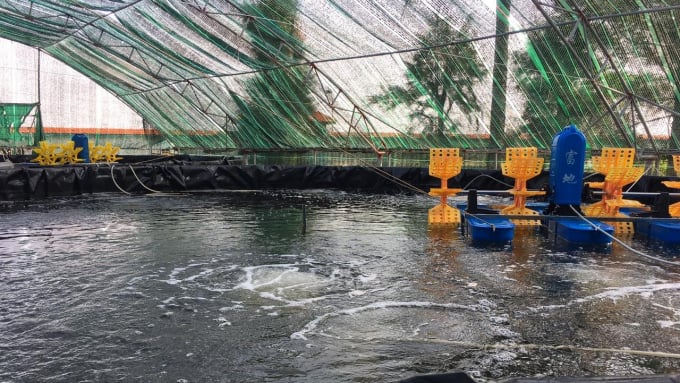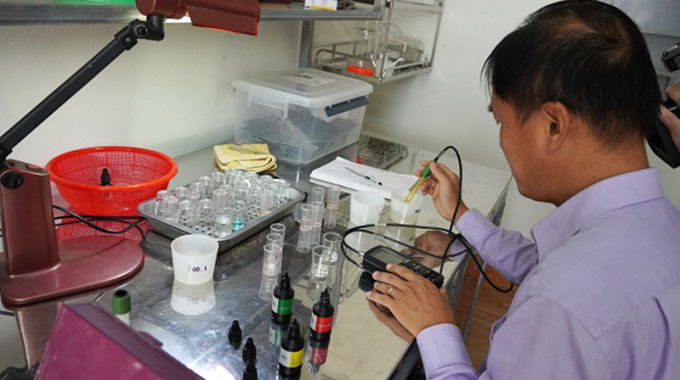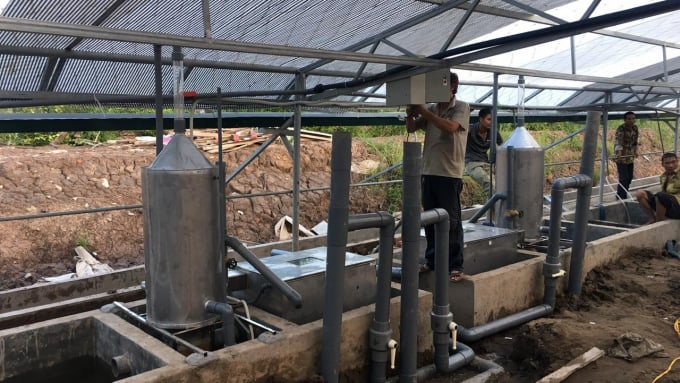June 17, 2025 | 12:32 GMT +7
June 17, 2025 | 12:32 GMT +7
Hotline: 0913.378.918
June 17, 2025 | 12:32 GMT +7
Hotline: 0913.378.918
The Institute of Resources and Marine Environment under the Vietnam Academy of Science and Technology has just researched and accepted the thesis "White-leg shrimp RAS farming". The institute is proposing to put the farming method into on-farm trials before transferring technology to mass production.

RAS technology helps shrimp farmers reduce risks. Photo: Dinh Muoi.
The technology offers major environment advantages compared to the traditional shrimp farming method while improving economic efficiency because farmers use less chemicals and antibiotics in this system and the production is stable.
Doctor Do Manh Hao, Head of Do Son Station for Marine Research (The Institute of Resources and Marine Environment) leading the research said RAS systems can improve water quality while reducing risks of disease infections because water resources are well-controlled. On the other hand, it can save space and water while farmers can be proactive on their farming plans.
According to Hao if a conventional shrimp pond sized1,000 cubic meter of water needs to be exchanged 50-70% of its water in the last months before harvest. 70% of the pond is used for storing water and only remaining 30% are used for shrimp farming. Meanwhile the ratio is 1:1 in RAS systems.
Farmers pump water into the system only once for each shrimp crop. The water is reused and recirculated continuously throughout the system.
It is worth noting that shrimp farming in this system has a success rate of 85% and can produce four shrimp crops per year and the yield can reach 15kg/m3/year, the feed conversion ratio is at 1.2 and production cost per kg of shrimp ranges from VND85,000-VND90,000.

Dr. Do Manh Hao is testing water quality. Photo: Dinh Muoi.
"Traditional shrimp farming still uses an open technology. During the cultivating process if the pond is contaminated the water must be drained and replaced. On the contrary, with RAS systems, water is discharged through a water treatment system and recirculated. Farmers can save water and reduce production costs. Moreover, they can also achieve higher economic returns," said Hao.
Hao added to generate 1kg of harvested shrimp it costs VND85,000 to VND90,000 in a 1,000 cubic meter shrimp RAS farm while the initial costs for a 500 cubic meter shrimp RAS farm can be up to one billion Vietnam dongs. That's why farmers and businesses are still hesitant to invest in the new system.
RAS technology for shrimp farming is now considered a trend globally to attain a goal of modern and sustainable agriculture.
Although a number of studies of this technology have been carried out in Vietnam only a few of them can be put into practice. The systems are mostly used in shrimp seed facilities but not popular in commercial shrimp farms.
The main reason is that the initial investment cost is higher than that of conventional farming models because a particular water treatment system must be designed and workers at farm must be well-trained. Moreover, once applying RAS systems the farm must maintain the technology all year round otherwise useful microorganisms can be turned into harmful ones.
Additionally, the technology is basically developed abroad to apply to large-scale shrimp farms so the cost is exorbitant. Therefore it's hard to put this technology into use in Vietnam where small-scale shrimp farms are dominant and farmers do not dare to try a new approach due to lack of finance.
However according to Hao although Vietnam does not take initiative in the technology several domestic enterprises are now able to make components and equipment that can be improved to be used in shrimp RAS farms. If farmers and businesses are interested in the technology they can buy at reasonable prices and flexibly apply for their farms

RAS technology is expensive and is not popular in Vietnam. Photo: Dinh Muoi.
In Hai Phong, shrimp farming mainly take places in the four districts including Duong Kinh, Kien Thuy, Tien Lang and Vinh Bao. Due to urbanization shrimp farming has faced some problems such as environmental pollution and unstable salinity which may have impact on productivity and economic efficiency.
To solve the problems many shrimp farmers have come up with many ideas including the application of RAS technology in white-leg shrimp farming. However the technology has not been popular for local shrimp farmers because of many reasons.
The Institute of Resources and Marine Environment has asked authorities in Hai Phong to test the project in the real world. If the project shows the positive results it can be replicated and farmers can apply the technology in their shrimp farming to attain a stable and consistent income.
"Shrimp farming has become a risky business in Hai Phong in recent years. Local shrimp farmers are often at risk of losing their crops because of environment pollution and salinity. If RAS technology is put into use soon farmers can solve the problems," said Hao.
Translated by Mai Tham
/2025/06/12/3721-2-202745_83.jpg)
(VAN) TH made an impression at Seoul Food 2025 with its line of natural beverages, paving the way for Vietnamese food products to enter the South Korean market.

(VAN) Soc Trang's success in rice exports stems from a strategy of developing fragrant and specialty rice cultivation areas and standardizing production toward low-emission practices.
/2025/06/11/1311-5-120811_839.jpg)
(VAN) The pig farming industry is facing the challenge of comprehensive restructuring to meet requirements for quality, safety, traceability, and market expansion both domestically and for export.

(VAN) Vietnam considers participating in ALGROALBA in order to expand agricultural production, coordinate the assessment and effective exploitation potential land.
/2025/06/05/5314-1-184727_407.jpg)
(VAN) From seemingly worthless fish scales and skin, enzymes and lactic ferments can transform by-products into peptides, opening a sustainable, effective business direction and elevating Vietnamese seafood.

(VAN) TTC AgriS and IFC signed a strategic partnership to develop a sustainable agricultural value chain, aiming to achieve the Net Zero target by 2035.

(VAN) Seafood by-products are opening a new path, combining green growth and technological innovation to enhance the industry's value.